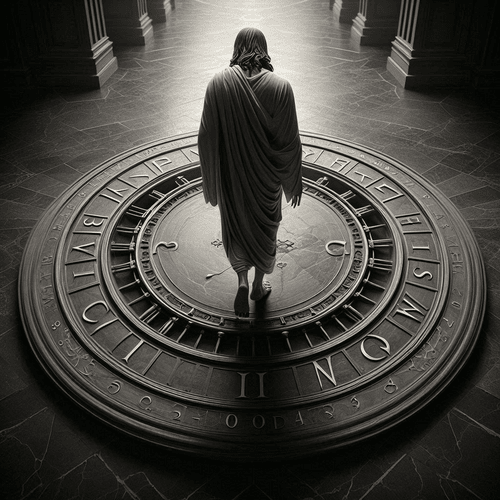Jesus and the Sabbath: Did He Break It or Fulfil It?
The Sabbath was at the centre of Jewish religious life—a divine command enshrined in the Ten Commandments, a covenant sign between God and His people. Yet Jesus’ actions on this sacred day repeatedly sparked controversy. His opponents accused Him, time and again, of breaking the Sabbath, while He claimed to reveal its true meaning. These confrontations weren’t minor disagreements but fundamental clashes about the nature of God’s law and how it is to be observed. Jesus wasn’t dismantling the Sabbath; He was unveiling its heart and purpose in God’s redemptive plan.
WHAT JESUS DID ON SABBATH DAY
The Gospels record numerous instances where Jesus’ conduct on Sabbath drew criticism. He healed a man with a withered hand in the synagogue, challenging onlookers to consider whether doing good was permissible on this day (Mark 3:1-6). He restored a woman bound by Satan for 18 years, and defended His action by comparing it to common practices such as watering animals (Luke 13:10-17). Perhaps most provocatively, after healing an invalid at Bethesda, Jesus responded to accusations claiming divine prerogative. He explained that He, like His Father, works continually (John 5:1-18).
When His disciples plucked grain on the Sabbath, Jesus defended them by referencing David’s eating of consecrated bread and how priests work on the Sabbath yet remain blameless (Matthew 12:1-8). These defences culminated in His remarkable claims: “The Sabbath was made for man, not man for the Sabbath” (Mark 2:27) and that He Himself is “Lord of the Sabbath” (Matthew 12:8)—assertions that placed Jesus in the position of the Sabbath’s authoritative interpreter.
SABBATH: THE THEOLOGICAL FRAMEWORK
Jesus grounded His Sabbath actions in profound theological principles. Citing Hosea, He emphasised God desires “mercy, not sacrifice” (Matthew 12:7), and that compassion reflects God’s heart more than ceremonial observance does. He said doing good is always lawful on the Sabbath (Matthew 12:12)—a statement revealing that the day’s purpose was never to prevent acts of mercy.
When confronted after healing on the Sabbath, Jesus made the profound statement that His Father is always working, and He likewise works (John 5:17). This connects Sabbath observance to God’s redemptive activity, which never ceases—even on the seventh day. The Sabbath, therefore, wasn’t merely about inactivity but about participating in God’s redemptive purposes.
THE PHARISEES’ MISUNDERSTANDING
The religious leaders in Jesus’ time, had constructed an elaborate system of Sabbath regulations—39 categories of prohibited work, with countless sub-regulations. Their approach focused on defining what constituted “work” rather than understanding the Sabbath’s redemptive purpose. Jesus repeatedly exposed how these human traditions had obscured divine intent (Mark 7:8-13).
The Pharisees’ legalism had inverted the Sabbath’s purpose—making it a burden rather than a blessing, turning a gift into a yoke. Jesus confronted the misunderstanding not by dismissing the Sabbath but by restoring its true meaning. His criticism wasn’t of the law itself but of its distortion through human traditions that missed God’s heart.
JESUS AS THE FULFILLMENT OF SABBATH REST
Understanding Jesus’ relationship to the Sabbath ultimately reveals how He embodies and fulfils what this sacred institution always symbolised. The Sabbath was never an end in itself, but always pointed toward the ultimate rest found in God’s redemptive work.
- Jesus fulfils rather than abolishes the Law: He explicitly stated He came not to abolish the Law but to fulfil it (Matthew 5:17-20). This fulfillment doesn’t diminish the Law’s importance but brings it to its intended completion and reveals its deeper purpose.
- Jesus offers true rest to the weary: Christ extends a profound invitation to all who labor and are heavy-laden to come to Him for rest (Matthew 11:28-30). The direct connection between Jesus and rest shows He provides what the ceremonial Sabbath could only symbolise—spiritual restoration and peace with God.
- The Sabbath was a shadow pointing to Christ: Paul explains Sabbath observances were shadows of things to come, with the substance belonging to Christ (Colossians 2:16-17). These shadows weren’t meaningless but were designed to prepare God’s people to recognise and receive the greater reality found in Christ.
- Jesus provides the ultimate Sabbath rest: The book of Hebrews develops the theme that a greater Sabbath rest remains for God’s people—one entered through faith (Hebrews 4:1-11). This ultimate rest isn’t merely ceasing from physical labour but ceasing from reliance on our own works for salvation and trusting completely in Christ’s finished work, instead.
CONCLUSION: JESUS AND THE SABBATH
Jesus’ encounters over the Sabbath weren’t about breaking God’s law but fulfilling its deepest intentions. As Lord of the Sabbath, He revealed its heart—pointing to Himself as the source of true rest. What seemed like violations of the Sabbath law were actually perfect fulfilments, demonstrating Sabbath observance finds its meaning in redemptive mercy, not in rigid regulation.
The Sabbath controversies ultimately reveal Jesus’ authority to interpret and embody divine law. By healing, restoring, and doing good on this day, He wasn’t breaking the Sabbath but demonstrating its purpose—to participate in God’s ongoing work of redemption, restoration, and rest. The invitation stands: to find in Christ the rest that the Sabbath always symbolized, the perfect fulfillment of God’s gift of rest to His creation.
JESUS AND THE SABBATH—RELATED FAQs
How does Jesus transform our understanding of rest? Jesus shifts our understanding of rest from mere inactivity to relationship-centred refreshment. True Sabbath rest isn’t primarily about what we refrain from doing but Who we’re communing with. In Christ, rest becomes an active trust in God’s completed work rather than our striving, pointing us to the deeper spiritual reality that we cannot earn our salvation but must receive it as a gift.
If Jesus is “Lord of the Sabbath,” does that make Sabbath observance optional for Christians? Jesus’ lordship over the Sabbath doesn’t abolish it but rather establishes His authority to reveal its true meaning and application. As Lord of the Sabbath, Christ fulfils what the day always symbolised while simultaneously teaching us how to properly observe its principles. The moral principle of setting aside time for worship and rest remains, though its ceremonial aspects have been fulfilled in Christ.
How do we practice grace-centred Sabbath observance rather than legalistic rule-following? Grace-centred Sabbath observance focuses on the restoration of relationship with God and others rather than rigid adherence to specific prohibitions. It asks, “How will this activity draw me closer to God and reflect His character?” rather than merely, “Is this allowed?” The Reformed tradition has consistently taught Sabbath observance should be motivated by delight in God’s goodness rather than dutiful compliance with regulations.
What’s the significance of Jesus performing healing miracles specifically on the Sabbath? Jesus’ Sabbath healings demonstrate restoration and redemption align perfectly with the day’s true purpose. By healing on the Sabbath, Christ showed the day was designed for wholeness and liberation from bondage, not as an obstacle to human flourishing. These miracles served as enacted parables of how salvation itself is God’s work on our behalf, not our work to earn divine favour.
How does the concept of Sabbath connect to the Reformed understanding of God’s sovereignty? The Sabbath powerfully illustrates Reformed theology’s emphasis on God’s sovereignty and our dependence. When we cease our labours and trust God’s provision, we acknowledge our work doesn’t ultimately sustain us—God does. The weekly practice of dependence reflects the heart of Reformed theology: salvation and provision come entirely from God’s grace, not human effort or merit.
How does Jesus’ approach to Sabbath challenge our modern “hustle culture”? Jesus’ teaching that “the Sabbath was made for man, not man for the Sabbath” provides a powerful corrective to our culture’s glorification of constant productivity. The Sabbath reminds us our value isn’t derived from what we produce but from being created in God’s image. Christ’s confrontation with Sabbath legalism challenges both ancient rule-keeping and modern achievement-based identity by establishing that rest isn’t a reward for work but a gift reflecting our status as God’s children.
Does the Christian worship on Sunday fulfil or replace the Sabbath command?
Christian worship on the Lord’s Day (Sunday) doesn’t nullify the Sabbath principle but fulfils and transforms it in light of Christ’s resurrection. The shift from the seventh to the first day of the week symbolises the new creation inaugurated by Christ’s resurrection, while maintaining the pattern of regular worship and rest. Reformed theology typically maintains the moral essence of the fourth commandment continues, though its particular expression has been transformed by the completed work of Christ.
Editor's Pick

Should We Stop Using Male Pronouns for God? Why Do We Say No?
A friend of ours arrived eagerly at his first theology class in seminary. But he quickly discovered something troubling: the [...]

Did Old Testament Law Force Women to Marry their Rapists?
**Editor’s Note: This post is part of our series, ‘Satan’s Lies: Common Deceptions in the Church Today’… Viral misinformation abounds [...]

From Danvers To Nashville: Two Statements, One Biblical Vision
30 years separate the Danvers Statement on Biblical Manhood and Womanhood (1987) and the Nashville Statement on Human Sexuality (2017). [...]

The Nashville Statement: Why Affirm It Despite Media Backlash?
WHY DO REFORMED CHRISTIANS STAND BY THIS STATEMENT ON MARRIAGE AND GENDER? When the Nashville Statement was released in 2017, [...]

Who Is Belial? Solving The 2 Corinthians 6:15 Mystery
Belial: This name from the pages of Scripture chills the soul. Who is this mysterious figure Paul invokes in 2 [...]

Celibacy Or Castration: What Jesus Really Means in Matthew 19:12
One of Scripture's most shocking misinterpretations led theologian Origen to castrate himself in the third century. His tragic mistake? Taking [...]

Philippians 4:13: Did Paul Really Mean We Can Do ALL Things?
"I can do all things through Christ who strengthens me." It's on gym walls, graduation cards, and motivational posters everywhere. [...]

The Ordinary Means of Grace: Why Are They Indispensable?
ORDINARY MEANS FOR EXTRAORDINARY TRANSFORMATION What if God's most powerful work in believers' lives happens through the most ordinary activities? [...]

Is the Bible God’s Word? Or Does It Only Contain God’s Word?
The authority of Scripture stands at the crossroads of modern Christianity. While some argue the Bible merely contains God’s Word [...]

Will We Remember This Life in Heaven? What Isaiah 65:17 Means
"Will I remember my spouse in heaven? My children? Will the joy we shared on earth matter in eternity?" These [...]
SUPPORT US:
Feel the Holy Spirit's gentle nudge to partner with us?
Donate Online:
Account Name: TRUTHS TO DIE FOR FOUNDATION
Account Number: 10243565459
Bank IFSC: IDFB0043391
Bank Name: IDFC FIRST BANK






